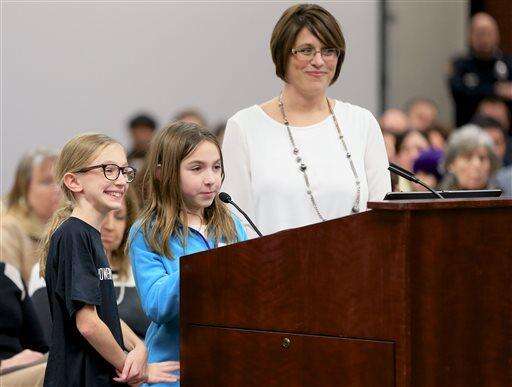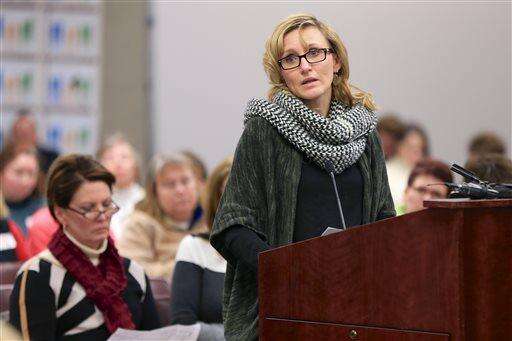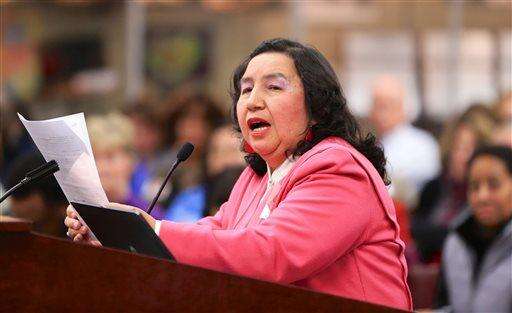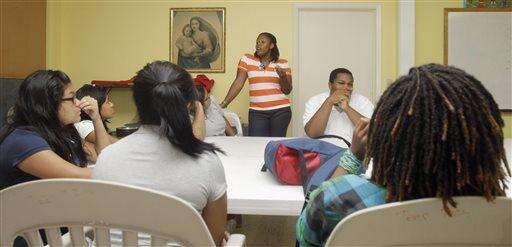ADVANCE FOR USE MONDAY, JAN. 18, 2015 AND THEREAFTER - In this Jan. 4, 2016 photo, Omaha Public Schools board President Lou Ann Goding and OPS superintendent Mark Evans listen to public comments during a meeting in Omaha, Neb., on plans to update the district's sex education curriculum for the first time in 30 years. Sex education in the U.S. has a long and checkered history, winning the backing of the U.S. Public Health Service in 1940, gaining traction in the 1980s during the early years of the AIDS epidemic, but generating steady opposition from social conservatives. (AP Photo/Nati Harnik)
The Associated Press
OMAHA, Nebraska (AP) - Rival factions yelling at one another amid angry pushing. Tirades about condoms, and claims of misinformation. A parent declaring that children are being force-fed course material "straight from the pits of hell."
Such has been the tenor of recent school board meetings in Omaha as board members contemplate the first update in three decades of the school district's sex education curriculum.
A public meeting in October ended in chaos after shouting and shoving broke out between supporters and opponents of the update who had packed by the hundreds into an auditorium. This month, as board members sat in stoic silence, activists from both sides vented their feelings during three hours of public comment - reflecting divisions that have bedeviled school boards nationwide, as well as state legislatures and even Congress.
Kathryn Russell, a grandmother who formerly worked for the Omaha school district, said the proposed curriculum "rapes children of their innocence." Another critic, Jesse Martinez, used the "pits of hell" reference, calling elements of the course material "garbage."
Supporters of the update - ranging from the president of the city council to students who spoke - exhorted the school board to equip students with reliable information that would help the Omaha region lower rates of teen pregnancy and sexually transmitted diseases that are above the national average.
"I have a right to this information," said Ryleigh Welsh, a sophomore at Omaha's Central High School. "Sexual health is more than just sex. It's about understanding and taking care of your body and being prepared for a healthy future."
In Omaha, as in many U.S. communities, some parents and conservative activists insist that any school-based sex education emphasize sexual abstinence as the wisest course. Yet as more young people turn to social media and online resources - including pornography- for sex-related information, there's pressure on schools from other quarters to offer accurate, candid information that can compete with and correct what's available beyond the classroom.
"The notion that sex education is limited to what happens in school is an antiquated one," said Bill Albert, chief program officer of the National Campaign to Prevent Teen and Unplanned Pregnancy. It is one of several organizations that's developing online sex education to supplement school-based programs.
In Omaha, school board president Lou Ann Goding said one of the motivations for updating the sex-ed curriculum is to counter misinformation that students encounter outside of school.
"There's so much social media and other sources that they can go to that are not always reliable," Goding said.
Sex education in America has a long and checkered history, winning the backing of the U.S. Public Health Service in 1940, gaining traction in the 1980s during the early years of the AIDS epidemic, but generating steady opposition from social conservatives.
Omaha Public Schools, which serves about 52,000 students, has taught sex education since 1986 as part of a course called Human Growth and Development.
Abstinence is encouraged in the curriculum, which also covers such topics as reproductive anatomy, pregnancy prevention and sexually transmitted diseases.
As initially proposed, the updates would add discussion of sexual orientation and gender identity in 7th and 8th grades, and discussion of abortion and emergency contraception in 10th-grade lessons on birth control.
The school district conducted a telephone survey of about 1,500 parents last year, and reported that a sizable majority supported adding those topics to the curriculum. But the margins of support for the abortion and emergency contraception components were smaller than for other topics, and school officials now plan to omit them.
Over the course of 2015, some churches and other groups began to circulate criticisms of the district's plans. Spearheading the opposition is a conservative Christian group, Nebraskans for Founders' Values, which has held briefings at local churches and encouraged skeptical citizens to attend school board meetings.
Many of the opponents' allegations have been denied by the school district, including claims that the new curriculum was designed by Planned Parenthood, would authorize school staff to take students to get abortions, and would provide them with birth control.
Board members stress that none of the sex-ed courses will be mandatory - parents must opt their children into the classes offered in 4th, 5th and 6th grade, and can keep them out of the classes in middle school and high school. Topics for 4th graders include puberty and how to stay safe from sexual abuse; by middle school students are learning about methods of contraception.
The board plans to vote on new standards for the sex-ed program on Jan. 20, then work on details of a new curriculum in time for any changes to be implemented next fall.
Sex education is taught in varied forms and under different rules across the 50 states.
According to the National Conference of State Legislatures, 22 states require public schools to teach sex education. In other states, including Nebraska, it's generally up to individual school districts to decide what form of sex education, if any, is offered. In 35 states, parents are allowed to keep their children out of sex-ed classes.
There's no detailed nationwide breakdown of how America's 13,500 school districts handle sex education, although the Centers for Disease Control compiles partial data. Its latest report, with 2014 data, suggests that programs in most school districts stress the benefits of sexual abstinence, while a smaller portion offer instruction in high school about usage of specific contraceptive methods.
In most of the U.S., fewer than half of high schools and only a fifth of middle schools teach all 16 topics recommended by the CDC as essential components of sex education.
While the federal government has no direct role in dictating sex-education curriculum, it has influence in the form of federal funding for various programs. From 1981, the start of Ronald Reagan's administration, through 2009, such funds went predominantly to abstinence-only programs; since 2010, under President Barack Obama, abstinence funding has been reduced and larger sums appropriated for comprehensive sex-ed programs.
Rival advocacy groups lobbied hard in Congress last year to get a favorable outcome for their approach. The end result maintained annual spending at about $100 million for the Teen Pregnancy Prevention Program, which incorporates comprehensive sex education, and doubled spending from $5 million to $10 million to abstinence-oriented programs.
According to the CDC's latest figures, from 2013, 44 percent of female teens and 47 percent of male teens between 15 and 19 have had sexual intercourse.
___
Follow David Crary on Twitter at http://twitter.com/CraryAP
ADVANCE FOR USE MONDAY, JAN. 18, 2015 AND THEREAFTER - In this Jan. 4, 2016 photo, Gwen Easter testifies before an Omaha Public Schools board meeting in Omaha, Neb. Easter, who runs a community center and preschool program, assailed the proposals to teach acceptance and understanding of gay and transgender youth. "That's the real agenda _ the same-sex stuff," she declared during remarks that drew cheers from her allies in the crowd. (AP Photo/Nati Harnik)
The Associated Press

ADVANCE FOR USE MONDAY, JAN. 18, 2015 AND THEREAFTER - In this Jan. 4, 2016 photo, Renee Fry, right, stands next to her daughter, Samantha Bourne, center, and fellow fourth grader Hadley Forsen, who jointly testified on the district's plans to update the sex education curriculum for the first time in 30 years, at an Omaha Public Schools board meeting in Omaha, Neb. The fourth graders said they already were getting "nonfactual" information from their friends on sex-related topics. "We need help to learn this curriculum at this age," said the girls, reading their statement in unison. "This will be way too embarrassing for us to ask our parents when we're older." (AP Photo/Nati Harnik)
The Associated Press

ADVANCE FOR USE MONDAY, JAN. 18, 2015 AND THEREAFTER - In this Jan. 4, 2016 photo, Deanna Rabuck speaks against plans to update the district's sex education curriculum for the first time in 30 years, at an Omaha Public Schools board meeting in Omaha, Neb. In a October 2015 meeting, she shouted, "I have five daughters! Five daughters! Who's going to keep them pure? I am! Not OPS!" (AP Photo/Nati Harnik)
The Associated Press
ADVANCE FOR USE MONDAY, JAN. 18, 2015 AND THEREAFTER - In this Jan. 4, 2016 photo, Ryleigh Welsh, a sophomore at Omaha's Central High School, testifies before an Omaha Public Schools board meeting in Omaha, Neb., in favor of plans to update the district's sex education curriculum for the first time in 30 years. "I have a right to this information," she said. "Sexual health is more than just sex. It's about understanding and taking care of your body and being prepared for a healthy future." (AP Photo/Nati Harnik)
The Associated Press

ADVANCE FOR USE MONDAY, JAN. 18, 2015 AND THEREAFTER - In this Jan. 4, 2016 photo, activist Amelia Den Hartog testifies at an Omaha Public Schools board meeting in Omaha, Neb. Den Hartog said comprehensive sex education would fuel promiscuity. "The most important sex organ is the brain," she said. "Please teach the students to use their brain... Let's empower our children to say no to sex outside of marriage, teach them to have self-control. They are not animals." (AP Photo/Nati Harnik)
The Associated Press
ADVANCE FOR USE MONDAY, JAN. 18, 2015 AND THEREAFTER - In this Jan. 4, 2016 photo, members of the public applaud in reaction to testimony against plans to update the district's sex education curriculum for the first time in 30 years, at an Omaha Public Schools board meeting in Omaha, Neb. (AP Photo/Nati Harnik)
The Associated Press
ADVANCE FOR USE MONDAY, JAN. 18, 2015 AND THEREAFTER - In this Jan. 4, 2016 photo, Chris Rodgers, president of the Douglas County Board of Health, testifies in favor of plans to update the district's sex education curriculum for the first time in 30 years, at an Omaha Public Schools board meeting in Omaha, Neb. Several black civic leaders were among the supporters of the curriculum update, including Rodgers, the head of the Urban League of Nebraska and City Council President Ben Gray. (AP Photo/Nati Harnik)
The Associated Press
ADVANCE FOR USE MONDAY, JAN. 18, 2015 AND THEREAFTER - In this Jan. 4, 2016 photo, a mobile billboard opposing sex education is parked outside during an Omaha Public Schools board hearing on a proposed update to the district's sex education curriculum. (AP Photo/Nati Harnik)
The Associated Press
ADVANCE FOR USE MONDAY, JAN. 18, 2015 AND THEREAFTER - In this Jan. 4, 2016 photo, Jesse Martinez speaks against plans to update the district's sex education curriculum for the first time in 30 years, at an Omaha Public Schools board meeting in Omaha, Neb. He depicted elements of the proposed course material as "garbage ... straight from the pits of hell." (AP Photo/Nati Harnik)
The Associated Press
ADVANCE FOR USE MONDAY, JAN. 18, 2015 AND THEREAFTER - In this Jan. 4, 2016 photo, members of the public applaud in reaction to testimony against plans to update the district's sex education curriculum for the first time in 30 years, at an Omaha Public Schools board meeting in Omaha, Neb. (AP Photo/Nati Harnik)
The Associated Press
ADVANCE FOR USE MONDAY, JAN. 18, 2015 AND THEREAFTER - In this Jan. 4, 2016 photo, Kathryn Russell, a Catholic grandmother who formerly worked for the school district, testifies against plans to update the district's sex education curriculum for the first time in 30 years, at an Omaha Public Schools board meeting in Omaha, Neb. Russell said that the proposed curriculum "rapes children of their innocence." (AP Photo/Nati Harnik)
The Associated Press
ADVANCE FOR USE MONDAY, JAN. 18, 2015 AND THEREAFTER - In this Jan. 4, 2016 photo, Maria Arriola, left, holds her 5 year-old daughter, Celina, during an Omaha Public Schools board meeting in Omaha, Neb., on plans to update the district's sex education curriculum for the first time in 30 years. (AP Photo/Nati Harnik)
The Associated Press
ADVANCE FOR USE MONDAY, JAN. 18, 2015 AND THEREAFTER - In this Nov. 15, 1967 file photo, teacher Clara Jones uses small figures to represent a family and interpersonal relationships during a class to help understand the complex emotional and physical problems of their growth, at Bancroft School in Washington. According to the National Conference of State Legislatures, 22 states and the District of Columbia require public schools to teach sex education in 2016. (AP Photo)
The Associated Press
ADVANCE FOR USE MONDAY, JAN. 18, 2015 AND THEREAFTER - In this Oct. 8, 2015 file photo, Justin Balido, peer health coordinator and senior health educator with Health Connected, speaks to a ninth-grade Teen Talk High School class at Carlmont High School in Belmont, Calif. Sex education in some American high schools is evolving beyond pregnancy and disease prevention to include lessons aimed at curbing sexual assaults. (AP Photo/Jeff Chiu)
The Associated Press

ADVANCE FOR USE MONDAY, JAN. 18, 2015 AND THEREAFTER - In this Sept. 10, 2010 photo, sex education teacher Shayna Knowles, center, talks to students during class at St. Andrew's Episcopal Church in Lake Worth, Fla. While the federal government has no direct role in dictating sex-education curriculum, it has influence in the form of federal funding for various programs. From 1981, the start of Ronald Reagan's administration, through 2009, such funds went predominantly to abstinence-only programs; since 2010, under President Barack Obama, abstinence funding has been reduced and larger sums appropriated for comprehensive sex-ed programs. (AP Photo/Alan Diaz)
The Associated Press

ADVANCE FOR USE MONDAY, JAN. 18, 2015 AND THEREAFTER - In this Oct. 8, 2015 file photo, Justin Pace reads along with classmates during a ninth-grade Teen Talk High School class at Carlmont High School in Belmont, Calif. Sex education in some American high schools is evolving beyond pregnancy and disease prevention to include lessons aimed at curbing sexual assaults. (AP Photo/Jeff Chiu)
The Associated Press